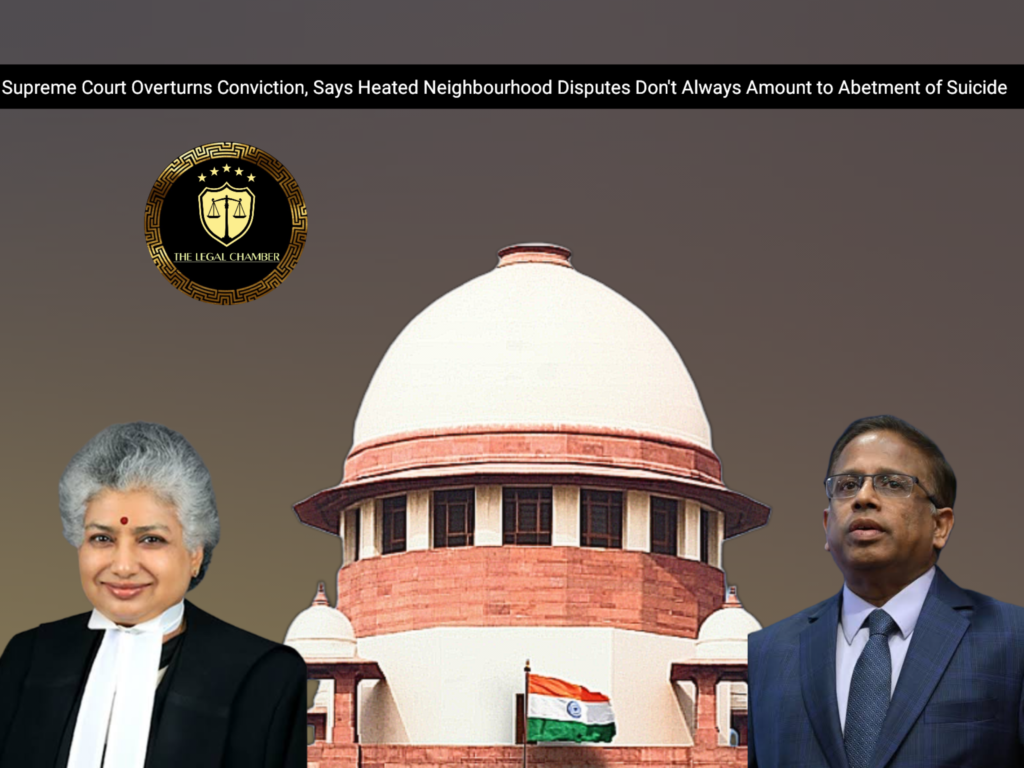
The Supreme Court acquitted the appellant of the charge under Section 306 IPC, holding that mere involvement in neighbourhood quarrels and heated exchanges, without a clear intention to instigate suicide, does not constitute abetment. The prosecution failed to establish that the appellant’s acts left the deceased with no option but to commit suicide, thereby lacking the requisite mens rea.
Facts Of The Case:
The case pertains to an incident on 12.08.2008, where Sarika, a 25-year-old BA student giving private tuitions, set herself on fire and later succumbed to her injuries. Before her death, her statement was recorded, alleging that the appellant, Geeta, her neighbour, had been harassing her for six months over noise disturbances from Geeta’s house. The deceased claimed that Geeta repeatedly abused her using filthy language and taunted her for being unmarried. The immediate trigger was an altercation on the evening of 12.08.2008, where Geeta, along with four family members, allegedly abused, assaulted, and threatened the deceased and her mother in front of their house. Mentally troubled by this, Sarika committed suicide a few hours later. The Trial Court convicted Geeta for abetment of suicide under Section 306 IPC and under the SC/ST Act, while acquitting the other four accused. The High Court upheld the conviction under Section 306 IPC but acquitted her under the SC/ST Act, reducing her sentence. The Supreme Court, in its final judgment, acquitted Geeta of all charges.
Procedural History:
The procedural history of the case began with the Trial Court convicting the appellant, Geeta, under Section 306 of the Indian Penal Code and Section 3(2)(v) of the SC/ST Act, while acquitting the four co-accused. Subsequently, the appellant challenged this conviction in the High Court of Karnataka. The High Court, in its judgment dated April 27, 2018, upheld the conviction under Section 306 IPC but reduced the sentence and acquitted her of the charges under the SC/ST Act due to insufficient evidence. The other co-accused remained acquitted. Finally, the appellant appealed to the Supreme Court, which, in its judgment dated September 9, 2025, set aside the High Court’s decision and acquitted the appellant of all charges, concluding that the essential ingredients for abetment of suicide were not met.
READ ALSO:Training is a Must: Supreme Court Judgment on Railway Recruitment and Service Confirmation
Court Observation:
The Supreme Court observed that to constitute an offence under Section 306 IPC, there must be a clear mens rea and an active or direct act intended to push the deceased to commit suicide, leaving them with no other option. It emphasized that mere involvement in neighbourhood quarrels, heated exchanges, or even physical altercations, without an intention to instigate suicide, does not amount to abetment. The Court distinguished the appellant’s actions, which were borne out of ongoing disputes, from the legal standard of instigation, noting that words uttered in a fit of anger or emotion, without intending the consequence of suicide, cannot satisfy the requirement of abetment. Consequently, the prosecution failed to establish that the appellant’s conduct created circumstances where the deceased had no alternative but to end her life.
Final Decision & Judgement:
The Supreme Court allowed the appeal and set aside the impugned judgment of the High Court. The Court acquitted the appellant, Geeta, of the charge under Section 306 of the Indian Penal Code, holding that the prosecution failed to prove the essential ingredients of abetment to suicide. It was concluded that the alleged acts of the appellant, stemming from ongoing neighbourhood disputes, did not constitute instigation with the intention to drive the deceased to commit suicide. The appellant, who was on bail, was ordered to be discharged from her bail bonds.
Case Details:
Case Title: Geeta Vs. The State of Karnataka Citation: 2025 INSC 1089 Criminal Appeal No.: Criminal Appeal No. 1044 of 2018 Date of Judgement: 9th September, 2025 Judges/Justice Name: Justice B.V. Nagarathna and Justice K.V. Viswanathan
Download The Judgement Here